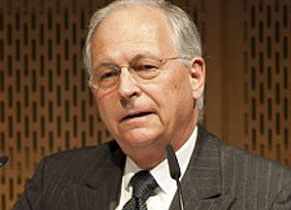Mr. Ahamed, you are an expert on the Great Depression. Do you see any similarities between today’s global economic situation and then?
Ahamed: There are numerous parallels between today’s economic crisis and the Great Depression. In both cases, we had boom decades that led to too much leverage, over-borrowing and bubbles in asset prices. In both cases, when the bubbles burst we had a dual crisis: a banking crisis in the United States and a separate banking and sovereign debt crisis in Europe.
The situation in Europe in particular is eerily similar. The position of countries like Greece and Portugal and Spain today are comparable to that of Germany, Austria and other central European countries in 1931: a run on the banking systems; the same nexus between governments short of cash and weak banks in need of government support; a rigid exchange rate that cannot be tampered with for fear of provoking a gigantic crisis of confidence thus forcing debtor countries to rely on the same unpalatable austerity measures. And finally we have the same big disagreements between the creditor countries and the debtor countries on who is to blame for the situation and hence no consensus on what should now be done. Ultimately it caused the gold standard, the equivalent at the time of the single currency, to fall apart.
There are of course big differences between then and now. Germany in the 1930s was the third largest economy in the world. Whereas Greece, Portugal, Ireland and Spain, even combined, don’t come close. Moreover Germany in the 1930s had absolutely no sources of external help: no European Central Bank to act as lender of last resort, no European Stability Mechanism to help roll over government debts, no IMF to step in with supplementary assistance.
Ambassador Ischinger, can you compare the situation with anything you’ve experienced in your career as a diplomat?
Ischinger: Major international crises always have one common feature: overcoming them requires cool-headed leadership and sustained international efforts.
What international structures need to be in place to keep a financial crisis like the one triggered in 2008 from happening again?
Ahamed: The fundamental cause of the crisis was over-borrowing, by households, banks and governments. While international arrangements like the Basle Accords on Bank Capital will help prevent future over leverage by the banks, ultimately preventing financial crises will remain the responsibility of national governments and their central banks.
Ischinger: We at Allianz favour a continued European integration process enabling the EU to compete with the rising powers in the world. On a global basis, we need agreement on basic rules, such as levels of capitalization of banks and insurance companies, and neither overt nor hidden trade barriers, granting equal opportunities and fair market conditions to all players in the market, in short: a level playing field. In view of the dynamic development of the BRICS and other rising powers, the US and the EU are best advised to quickly enter into a free trade agreement. Its benefits far outweigh its downsides.
What steps would you propose for the EU and the euro zone? Who do you think can drive that forward?
Ischinger: We need concrete steps towards a fiscal union, including a banking union with a single supervisor. Responsibilities lie with the EU Council, the European Commission and the EU’s national governments. But there is also a continuing central role for the ECB.
Ahamed: I think we have learned that a monetary union can only work if it is combined with some variant of a fiscal union and a banking union.
Compare the US and Europe. In both cases the sources of the financial crisis were quite concentrated: In the US, Nevada, Florida, Arizona, and California accounted for much of the housing bubble; while in Europe the troubles were centered in Southern Europe. The US has managed to weather its storm much better than Europe largely because its response to the downturn and the banking problems was primarily federal.
Neither Nevada nor Florida nor California nor any of the states that were badly hit had to cope with the crisis on their own. All the states chipped in. The political machinery kicked into gear and they had New Yorkers and Midwesterners paying for the mistakes of Floridian homeowners or bailing out a bank based in North Carolina or financing unemployment checks in Michigan. And it all happened quite automatically without demonstrations in the street, constant changes in governments or 21 different summits of state governors to figure out how the burden should be shared.

